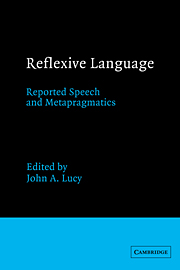Book contents
- Frontmatter
- Contents
- Acknowledgments
- General introduction
- Part I Theoretical foundations
- Part II The relation of form and function in reflexive language
- Part III Text, context, and the cultural functions of reflexive language
- Introduction to Part III
- 7 Generic versus metapragmatic dimensions of Warao narratives: who regiments performance?
- 8 Performance form and the voices of characters in five versions of the Wasco Coyote Cycle
- 9 The represented functions of speech in Shokleng myth
- 10 The political function of reported speech: a Belauan example
- Part IV Interpretation, reported speech, and metapragmatics in the Western tradition
- Name index
- Subject index
10 - The political function of reported speech: a Belauan example
from Part III - Text, context, and the cultural functions of reflexive language
Published online by Cambridge University Press: 22 January 2010
- Frontmatter
- Contents
- Acknowledgments
- General introduction
- Part I Theoretical foundations
- Part II The relation of form and function in reflexive language
- Part III Text, context, and the cultural functions of reflexive language
- Introduction to Part III
- 7 Generic versus metapragmatic dimensions of Warao narratives: who regiments performance?
- 8 Performance form and the voices of characters in five versions of the Wasco Coyote Cycle
- 9 The represented functions of speech in Shokleng myth
- 10 The political function of reported speech: a Belauan example
- Part IV Interpretation, reported speech, and metapragmatics in the Western tradition
- Name index
- Subject index
Summary
Introduction
In the course of his discussion of discourse in the novel, Bakhtin (1981) points out that the social-historical fact of the “internal stratification” of language into dialects, jargons, and speech genres is the prerequisite for the stylistic “heteroglossia” of the modern polyphonic novel, in which authorial speech, narrator's speech, and the speech of characters enter into complex “interanimation.” Many of Bakhtin's specific analyses of literary techniques found in novelistic heteroglossia can be transferred to the anthropological study of language in its social context. In particular, in the novel as in social life, speech constantly takes as an object of reference or representation previous speech, as in direct and indirect quotation of the actual utterances of others. As Bakhtin notes,
The topic of a speaking person has enormous importance in everyday life. In real life we hear speech about speakers and their discourse at every step. We can go so far as to say that in real life people talk most of all about what others talk about — they transmit, recall, weigh and pass judgment on other people's words, opinions, assertions, information; people are upset by others' words, or agree with them, contest them, refer to them and so forth.
(Bakhtin 1981: 338)- Type
- Chapter
- Information
- Reflexive LanguageReported Speech and Metapragmatics, pp. 261 - 286Publisher: Cambridge University PressPrint publication year: 1993
- 13
- Cited by



